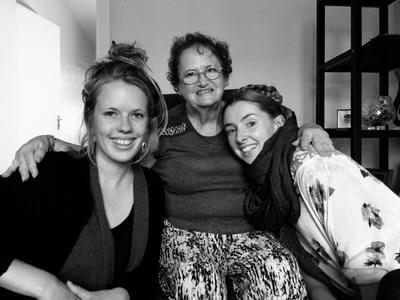We Are Randox | Parkinson’s disease documentary leads to Film Festival Award for R&D Scientist Carol Naughton
We Are Randox | Parkinson’s disease documentary leads to Film Festival Award for R&D Scientist Carol Naughton
Behind the doors of Randox, ground breaking scientific research is happening.
From Alzheimer’s disease to gastro-intestinal disorders, bladder cancer to cardiovascular disease, diabetes to kidney injury, our team of R&D scientists work on pioneering research projects in the areas of health that matter most, and ultimately, they save lives.
This week, we spoke to Carol Naughton, R&D Scientist in our Randox Teoranta team in Donegal, who has recently been part of an award-winning film documentary which aims to let people into the minds, the labs and the projects of scientists working on pioneering health research like that which takes place in Randox.
The film project, called ‘Feats of Modest Valour’, focuses on the lives of three individuals with Parkinson’s disease, Brian, Tom and Milena, and on a team of scientists working to find a cure for the condition. Aiming to bridge the gap between scientists and the very people the research will have the most impact on, Carol explains how working with Parkinson’s disease sufferers was the most humbling experience of her life.
Here’s Carol’s story.
The opportunity to be involved with Feats of Modest Valour (FOMV) was a gradual one. It was towards the end of my PhD when my supervisor, Dr. Eilis Dowd was awarded a grant as part of an EU consortium called Horizon 2020, with a new initiative to cure Parkinson’s disease. One of the remits of being in receipt of this grant was a community outreach programme called Science on Screen, and because of this, the Feats of Modest Valour documentary was born. It was commissioned by the Science Foundation Ireland Centre for Research in Medical Devices (CÚRAM) and the Galway UNESCO City of Film and Galway Film Centre.
Several projects were pitched to film makers to connect with the general public, and as a result of our pitch which revolved around the gene-environment interaction and increased susceptibility in Parkinson’s disease, ISHKA Films (Alice McDowell and Mia Mullarkey) production company decided to focus on our work. As part of the Horizon 2020 grant, the brain mattrain project is focussing on the development of a new biomedical device for Parkinson’s disease which will, for the first time, target the underlying cause of Parkinson’s disease rather than purely addressing the motor symptoms.
One of the most appealing aspects of the project was the platform for engaging with the general public. There is so much fascinating research being performed for a host of diseases all over Ireland but yet there sometimes seems to be a disconnect between that and the very people who the research will have the most impact on.
This was something we were very interested in when we hosted a conference in Galway in 2014. For the NECTAR (Network for European CNS Transplantation and Restoration) conference, which brings together a unique audience of clinicians and scientists from all over the world to disseminate their research and results of clinical trials. We wanted to do something different, to broaden the scope of the conference, so we integrated a patient-oriented focus into the programme. The founder of Cure Parkinson’s UK, Tom Isaacs (1968-2017), who was diagnosed with the disease when he was only 27, attended the event and spoke passionately about trying to bridge the gap between clinicians, scientists and patients. Being part of FOMV gave us the opportunity to do this, to merge science and real life.
It helped therefore that I had been spending quite a lot of time with Brian and with people from the Parkinson’s Association of Ireland. It has several branches all over the country so I spent quite a lot of time talking with them, organising charity walks, hosting information days and securing funding for speech and language therapists for them. Considering the wealth of knowledge that you can acquire throughout the course of a PhD, it is really rewarding being able to give something back.
When I look back, easily the best part about FOMV was spending time with people with Parkinson’s disease. It is quite easy to forget the bigger picture, the reason why you set out to do research in the first place. This was an opportunity for me to interact with people who were suffering with Parkinson’s disease and talk with them and explain to them about our research. The platform for relaying scientific research to the general public is definitely an under-utilised one. For the majority of research, people do not know what is going on. When the tailor for the documentary was first shown to people, the most common response you heard back was: “I can’t believe this is happening on our backdoor,” or “That was so easy to follow and to understand,” or “Why don’t more scientists do this to explain their research to us?”
Our documentary was recently submitted to a film festival in New York called the Imagine Science Films (ISF) festival, in collaboration with the American Association for the Advancement of Science (AAAS). The select jury included Nobel prize-winning scientist Professor Martin Chalfe, and award-winning science columnist for the New York Times, Professor Carl Zimmer.
We were absolutely delighted when FOMV won The Scientist Award, which is awarded to a film that portrays, accurately and importantly inventively, the life of a scientist. The goal of this award is to encourage more scientists to create films that let people into their minds, into their labs and into their lifestyle. In addition to the top science award, FOMV was also awarded runner up People’s Choice Award. This award is presented to the documentary that receives the most audience votes during the festival.
Being part of Feats of Modest Valour was definitely one of the most humbling experiences I have ever had. I have met so many people who suffer with Parkinson’s disease and in the face of such a relentless disease, they have such incredible resolve to make the most of their lives. We tend to take so much for granted and forget to appreciate the little things. And while that sounds very clichéd, Milena, Brian and Tom are no longer in a position to do that. They live a completely clockwork existence based around the particular time when they take their medication. And even then, their days are more bad than good.
That’s why the title of the documentary ‘Feats of Modest Valour’ is based on a poem called ‘No signs of struggle,’ by an American poet named Robin Morgan, who was diagnosed with Parkinson’s disease;
“You can spot it in the provocation of a button, an arm poking at a sleeve, a balancing act at a night-time curb while negotiating the dark. Feats of such modest valour, who would suspect them to be exercises in an intimate, fierce discipline, a metaphysics of being relentlessly aware.”
Make sure to tune in to RTE One on Sunday 12th of November, when ‘Feats of Modest Valour’ is on at 10.35pm.
For more We Are Randox stories about our amazing colleagues, make sure to follow us on Facebook, Instagram and Twitter and follow the hashtag #WeAreRandox.
For current vacancies in our team, visit careers.randox.com






